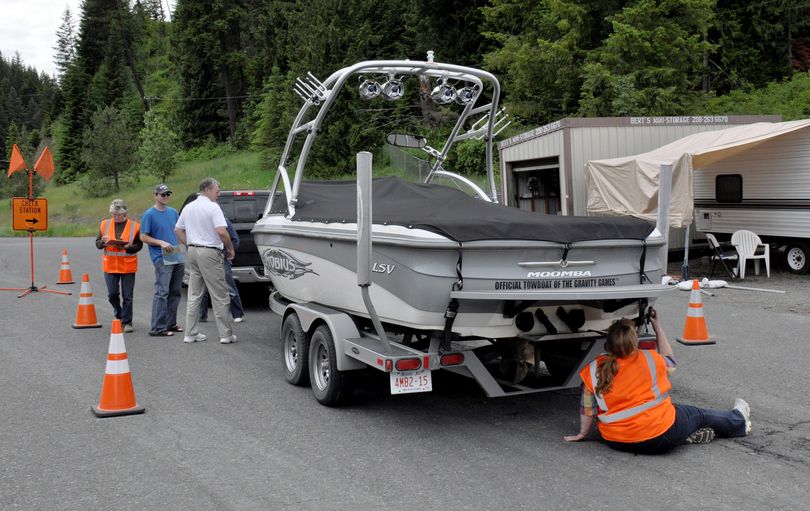Idaho checks first quagga-mussel infested boat of season

BOATING -- Mandatory watercraft inspection stations have barely opened for the season in Idaho, and they already have reported finding the year's first boat fouled with quagga mussels, a potentially devastating invasive species.
The boat was checked at the Cotterell Port of Entry station on Interstate 84 near Burley.
The program aims to inspect boats that are entering the region from mussel-infested states. The boat intercepted at the Cotterell inspection station recently spent time in Lake Powell in the Glen Canyon National Recreation Area. Lake Powell, operated by the National Park Service, recently was identified as infested with quagga and zebra mussels.
The National Park Service still does not require decontamination of watercraft leaving its facilities with mussel infestations, even though it means possible introduction of these invasive species to the clean waters of the Pacific Northwest. This also indicates that potentially infested boats are being transported outside of the traditional boating season, which is a concern for Pacific Northwest states.
Since Idaho initiated its watercraft inspection program in 2009, nearly 200,000 boats have been inspected. About 100 mussel-fouled boats have been intercepted and decontaminated before they launched into Pacific Northwest waters, the Idaho Department of Agriculture reports.
“Idaho’s watercraft inspection program underscores the importance of preventing these mussels from becoming established in Idaho’s waters,” Agriculture Director Celia Gould said. “All of Idaho’s waterbodies have tested negative for these species, but they have been found in waters of other western states, and are causing severe economic and environmental harm in other regions of the country. We continue to work with our regional partners to prevent these fouled boats from launching in Pacific Northwest waters.
"Catching mussel-fouled boats so early in the season is a real wake up call. The more the public is educated about these invaders, the more enthusiastic and vigilant they are in joining efforts to keep them out of the Pacific Northwest.”
Idaho law requires all boaters must stop at the stations, such as the one on Interstate 90 near Fourth of July Pass.
Watercraft inspectors are looking for high-risk boats that have been in quagga- and zebra-mussel impacted waters such as Lake Powell, Lake Mead, Lake Havasu and Lake Pleasant.
If you have launched in a mussel-infested waterbody in the last 30 days, you must have an inspection before you launch in Idaho. For a complete list of infested waters, a five-year summary of inspection efforts, and a list of Idaho inspection stations, see: www.invasivespecies.idaho.gov
- To schedule a free inspection, call (877) 336-8676 .
Read on for recommendations for boaters:
It is important that boaters arrive in Idaho with a clean, drained and dry watercraft. Zebra mussels and quagga mussels are invasive species. They are European in origin and range in size from microscopic to the size of a fingernail, depending on the life stage. They are prolific breeders and attach themselves to hard and soft surfaces, fouling freshwater ecosystems and clogging intake pipes that draw water from infested waterbodies. They cause significant maintenance challenges for raw-water systems, requiring millions of dollars annually to treat.
ISDA urges all boaters to take the following steps to prevent the introduction of the mussels to Idaho:
• Inspect all exposed surfaces - small mussels feel like sandpaper to the touch
• Wash the hull thoroughly, preferably with hot water
• Remove all plant and animal material
• Drain all water and dry all areas
• Drain and dry the lower outboard unit
• Clean and dry all live wells
• Empty and dry any buckets
• Dispose of all bait in the trash
• Wait five days and keep watercraft dry between launches into different fresh waters
